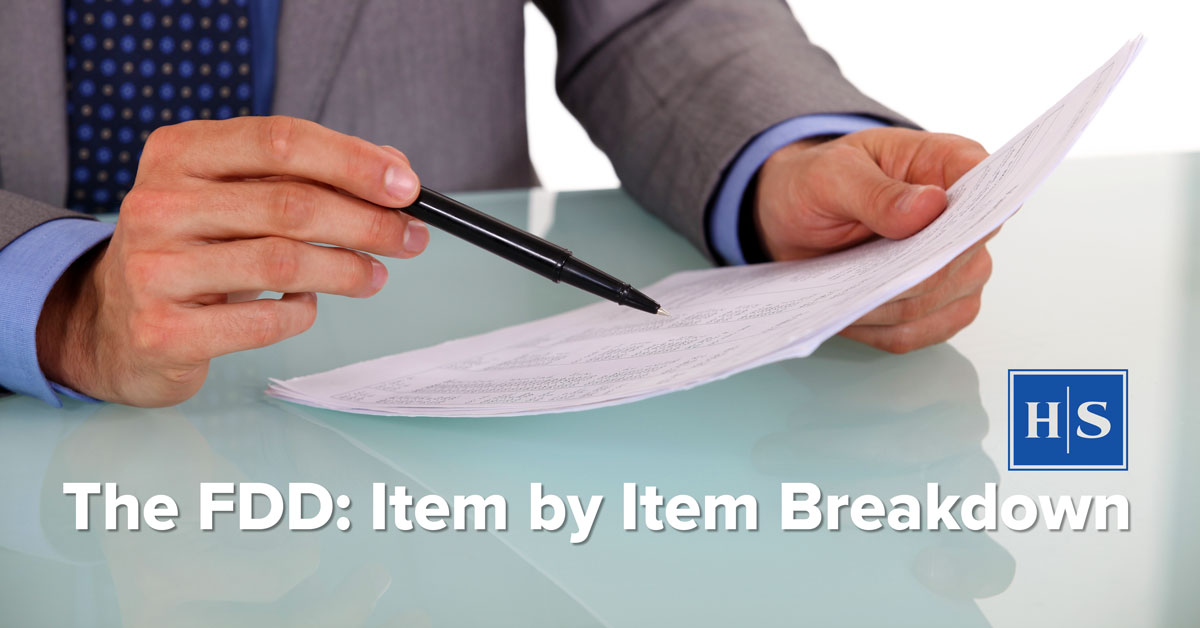Getting to know the types of franchise disclosures and some of the red flags can be very helpful to any prospective franchisee.
If you have ever looked into acquiring a franchise, you are probably familiar with the term Franchise Disclosure Document (“FDD”), which is a newer term for and for Uniform Franchise Offering Circular (“UFOC”). The FDD has replaced the UFOC in name, but the disclosures in the document have remained largely the same.
The Franchise Disclosure Document has 23 listed “Items” and numerous exhibits, all required by federal law. Roughly half of the Items are simply an analysis of the franchise agreement, which is an attachment to the FDD.
What's the difference between a Franchise Disclosure Document and a Franchise Agreement?
While the analysis may be helpful, the franchise agreement is binding (an obligation that cannot be broken) and the FDD is not. Understanding the franchise agreement is a topic for another day. The remaining Items and the information they convey can add critical insight into the health and strength of the franchisor, whether it is growing or shrinking and whether it is a good or not so good investment.
The FDD is broken down in items, that we'll go into detail below.
Item 1 – in the first item of the FDD, you find out about the type of business you are buying, how long the franchisor has been selling franchises, what kinds of competition exist and other relevant facts. Item 1 sets the framework for your basic understanding of the franchise opportunity being offered.
Item 2 – this item describes the business experience of the principal officers of the franchisor. A franchisor owns the rights and trademarks and has the power to grant a license to a third party to use the marks of the franchise. The best franchise companies have experienced leadership with Individuals who understand franchising, not just the business opportunity being offered.
Operating a restaurant and, for example, selling restaurants and making sure the individuals buying those restaurants are successful, are two vastly different businesses requiring different business skills. Look for franchisors that are knowledgeable about their industry but also knowledgeable about franchising and running a successful franchisor.
Item 3 - identifies litigation in which the franchisor is a party. If this Item has numerous disclosures of lawsuits between the franchisor and individual franchisees, stop, read no further, keep your money in your pocket and look for another franchise opportunity. Regardless of the reasons for the litigation, you don’t want to be involved with a litigious franchisor and multiple lawsuits are both a distraction and a financial drain. There are other opportunities.
Item 4 - is bankruptcy. If the Item doesn’t state that there is no information that needs to be disclosed, then you have another red flag. But in this case, check the financial disclosures the franchisor makes as part of Item 21 and the Exhibits to the FDD to determine if it is financially sound. If it is not financially sound and there is a history of bankruptcy, that’s probably not a winning combination. In fact, with or without a history of bankruptcy, if the franchisor is not financially sound, it is probably best not to invest your money in that franchise system.
Items, 5, 6 and 7 - are all financial disclosures. Review these carefully with your financial advisor. Prepare a pro forma (financial statement that calculates projections) and determine what your annual costs will be and the revenue you need to cover costs, pay any debt service you may have and bring home enough to live on. Your financial analysis is a critical part of determining whether this is the right business opportunity for you.
Items 8 through 17 - contain information that can also be found in the franchise agreement. The franchise agreement is what controls, so here is where experienced legal counsel can advise you if the franchise agreement is fair to the franchisee, more standard in the industry (which typically heavily favors the franchisor) or so severe as to be unfair to the franchisee and even a bar to pursue the franchise opportunity. Some franchisors are so intent on protecting themselves they do so to the extreme detriment of the franchisee.
Item 18 - identifies public figures associated with the franchise.
Item 19 - contains financial information which should be reviewed carefully as discussed above.
Item 20 - contains all kinds of helpful information on both franchised outlets and company owned outlets. Is the franchise system growing? Is the franchisor selling new units but then they fail to open in a reasonable timeframe? Are existing franchisees selling and getting out of the system? Are units simply closing and not being replaced? Obviously, these are important questions and there answers can paint a picture as to whether the franchised system is growing, declining or stagnant.
Item 21 - - contains financial information which should be reviewed carefully as discussed above.
Item 22 - lists the contracts attached as exhibits to the FDD.
Item 23 - is simply a receipt signed by the prospective franchisee acknowledging that she/he received the FDD and the date of receipt.
Prospective franchisees can get a good deal of information from the FDD and franchise agreement in determining whether a particular franchise opportunity is the right one for them. A good final check is to call some successful franchisees and some ex-franchisees that may have failed (or left the system for one reason or another). Doing your due diligence can mean the difference between future success or failure.
If you have questions about franchises or the franchise disclosure document, please contact Joel D. Rosen at 610-275-0700 or jrosen@highswartz.com. Our Franchise Law attorneys provide comprehensive legal services to assist in all of these matters.
The information above is general: we recommend that you consult an attorney regarding your specific circumstances. The content of this information is not meant to be considered as legal advice or a substitute for legal representation.
